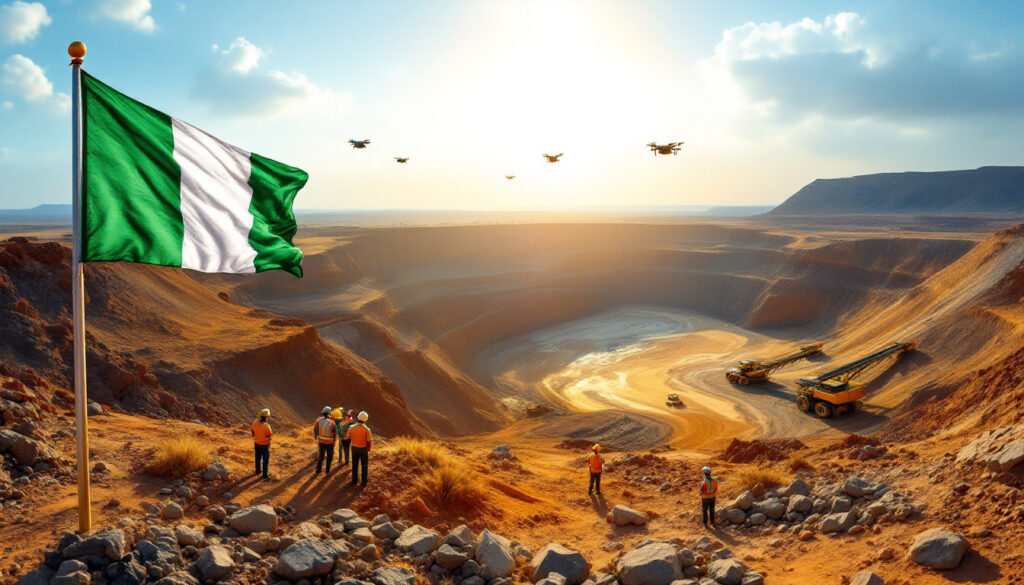Nigeria and South Africa Minerals Pact: Strategic Partnership for Economic Diversification
The Nigeria-South Africa minerals pact, signed in April 2025, represents a landmark collaboration between Africa's two largest economies to revolutionize Nigeria's untapped mining potential. This strategic partnership aims to leverage South Africa's established mining expertise to help Nigeria diversify its economy beyond oil dependency, targeting the country's rich but underutilized mineral resources. Through technological exchange, knowledge transfer, and joint exploration initiatives, both nations stand to gain significant economic benefits while strengthening pan-African cooperation in digital mining innovations.
What is the Nigeria-South Africa Minerals Pact?
The Nigeria-South Africa Minerals Pact establishes a comprehensive framework for bilateral cooperation in mineral exploration, development, and value addition. Signed during a high-level summit in Lagos in April 2025, the agreement represents the most significant mining collaboration between Africa's two economic powerhouses in decades.
According to Nigeria's Minister of Solid Minerals Development, Dele Alake, "This partnership brings together South Africa's world-class mining expertise and Nigeria's vast untapped mineral potential to create a transformative force in Africa's mining landscape."
Key Elements of the Minerals Pact
The partnership encompasses several strategic components designed to accelerate Nigeria's mining sector development:
-
Advanced geological mapping using South African drone technology equipped with multispectral sensors capable of identifying mineral deposits at depths of up to 100 meters
-
Comprehensive mineral data sharing through a secure digital platform connecting Nigeria's Geological Survey Agency with South Africa's Council for Geoscience
-
Joint exploration initiatives focusing on strategic minerals including lithium, gold, iron ore, and rare earth elements critical to renewable energy technologies
-
Technical knowledge transfer programs, with South Africa's Mining Industry Growth, Development and Employment Task Team (MIGDETT) providing specialized training for Nigerian mining professionals
Why is Nigeria Pursuing Mining Diversification?
Nigeria's economic vulnerability to oil price fluctuations has become increasingly apparent in recent years. Despite being Africa's largest oil producer, the country's over-reliance on petroleum has created dangerous economic imbalances. Oil accounts for approximately 90% of Nigeria's export earnings and 70% of government revenue, yet employs less than 1% of the workforce.
This dangerous dependency has prompted Nigeria's government to pursue aggressive economic diversification strategies, with mining identified as a priority sector with substantial growth potential.
"We must break free from the oil monoculture that has dominated our economy for too long," Minister Alake emphasized during the pact signing ceremony. "Our mineral wealth represents Nigeria's economic future, but we need South Africa's proven expertise to unlock its full potential."
Nigeria's Mineral Wealth Potential
Nigeria's mineral endowment is remarkable but largely unexploited:
-
Geological surveys have confirmed 23 mineral deposits in commercial quantities across Nigeria's 36 states
-
The country possesses significant reserves of gold, with the Segilola mine in Osun State already producing 80,000 ounces annually since 2021
-
Nigeria's lithium deposits in Nassarawa State are estimated at 150,000 tonnes, potentially supplying 5% of global demand by 2030 as electric vehicle production accelerates
-
High-grade iron ore deposits in Kogi State contain up to 68% iron content, comparable to premium Australian and Brazilian ores
-
Zinc reserves in the Middle Benue Trough exceed 5 million tonnes but remain largely unexploited
Currently, the mining sector contributes less than 1% to Nigeria's GDP, compared to countries like Ghana (approximately 5%) and South Africa (about 8%), highlighting the enormous growth potential.
How Will South Africa Benefit from the Partnership?
While Nigeria gains critical mining knowledge, South Africa stands to reap substantial benefits from this collaboration, extending its mining influence into West Africa's resource-rich territories.
Strategic Advantages for South Africa
South Africa's mining sector sees several compelling opportunities:
-
Strategic access to Nigeria's underdeveloped mineral reserves, particularly lithium, which South Africa currently lacks in significant quantities
-
Expansion opportunities for established South African mining companies like AngloGold Ashanti and Sibanye-Stillwater into West Africa's growing mining sector
-
Strengthening of regional economic integration ahead of full African Continental Free Trade Area (AfCFTA) implementation
-
Technology export potential, with South African mining equipment manufacturers targeting Nigeria's emerging market
As South Africa's Minister of Mineral Resources and Energy noted, "This partnership represents not just resource opportunity but a chance to export South African mining excellence across the continent."
South Africa's Mining Expertise
South Africa brings formidable capabilities to the partnership:
-
Over 150 years of mining experience, contributing 47% of Africa's total mineral production
-
World-class geological mapping technologies, including AI-assisted exploration methods
-
Advanced mineral processing techniques, particularly in gold and PGM beneficiation
-
Comprehensive mining education programs through institutions like the University of Witwatersrand's School of Mining Engineering
-
Experience in sustainable mining practices, with one of Africa's most developed mine rehabilitation frameworks
What Challenges Does Nigeria's Mining Sector Face?
Despite its potential, Nigeria's mining sector faces substantial obstacles that have hindered its development.
Current Limitations in Nigeria's Mining Industry
Nigeria's mining challenges include:
-
Severely limited geological data, with less than 30% of the country comprehensively mapped for mineral deposits
-
Inadequate physical infrastructure, including unreliable power supply and poor transportation networks
-
Dominance of informal, artisanal mining activities operating outside regulatory frameworks
-
Technical capacity gaps, with an estimated shortage of 5,000 qualified mining engineers and geologists
-
Regulatory bottlenecks and lengthy permitting processes, with mining license approvals taking up to 24 months
-
Security concerns in certain mineral-rich regions hindering formal exploration
Investment in the sector has remained minimal, with only 0.5% of Nigeria's national budget allocated to mining development, creating a severe infrastructure deficit.
How the South Africa Partnership Addresses These Issues
The partnership focuses on practical solutions to these challenges:
-
Implementation of South Africa's advanced geological mapping techniques to close Nigeria's data gaps
-
Establishment of a $500 million infrastructure development fund targeting mining transportation networks
-
Regulatory harmonization aimed at reducing mining license approval times by 30%
-
Tailored security protocols based on South Africa's experience in protecting mining operations
What Economic Impact Could This Partnership Create?
The economic implications of successfully developing Nigeria's mining sector are substantial for both countries and the broader African economy.
Potential Economic Benefits for Nigeria
Economic projections suggest the partnership could generate:
-
Addition of $12 billion annually to Nigeria's GDP by 2030, representing a ten-fold increase in mining's contribution
-
Creation of approximately 500,000 direct and indirect jobs across the mining value chain
-
Reduction in Nigeria's $3 billion annual steel import bill through domestic iron ore processing
-
Foreign exchange diversification, decreasing economic vulnerability to oil price shocks
-
Tax revenue increases estimated at $2.5 billion annually from formalized mining operations
The Lagos Chamber of Commerce forecasts that successful implementation could drive 8% industrial growth across Nigeria's manufacturing sector through improved mineral input availability.
Regional Economic Implications
The partnership model could reshape Africa's mining landscape:
-
Establishment of a south-north mineral development corridor enhancing pan-African trade
-
Development of regional mineral processing hubs reducing dependency on extra-African processing
-
Potential replication of the bilateral model across other African resource-rich nations
-
Enhanced African bargaining power in global commodities insights through coordinated approaches
How Does This Fit Into Nigeria's Broader Economic Strategy?
The Nigeria and South Africa minerals pact aligns seamlessly with Nigeria's National Development Plan 2025-2030, which prioritizes economic diversification and industrialization.
Alignment with National Development Goals
The agreement supports multiple national priorities:
-
Advancement of Nigeria's Economic Recovery and Growth Plan targeting non-oil sector expansion
-
Integration with the National Industrial Revolution Plan aiming to build mineral-based industries
-
Support for Nigeria's Energy Transition Plan, which requires critical minerals for renewable technologies
-
Advancement of skill development objectives in Nigeria's National Policy on Education
The partnership also strengthens Nigeria's ability to implement the African Mining Vision, adopted by African Union member states to ensure mining contributes to broad-based development.
What Specific Minerals Will Be Prioritized?
The Nigeria-South Africa partnership has identified strategic minerals based on global demand trends, domestic industrial needs, and existing exploration data.
Strategic Mineral Focus Areas
Priority minerals include:
-
Gold: Building on the success of Thor Explorations' Segilola gold mine, which operates at 98% recovery rates, significantly higher than the 85% industry average
-
Lithium: Addressing global demand for battery materials, with Nigeria's spodumene deposits in Nassarawa containing lithium oxide concentrations of 1.5-2.0%, comparable to commercial grades
-
Iron ore: Developing the high-grade (68% Fe) deposits in Kogi State to supply Nigeria's steel industry
-
Zinc: Unlocking the Middle Benue Trough reserves essential for galvanization and industrial applications
-
Rare earth elements: Exploring Nigeria's potential for dysprosium and neodymium, critical for renewable energy technologies
The partnership will prioritize minerals that support industrial development while capitalizing on growing global demand for energy transition materials.
What Implementation Timeline Can Be Expected?
The Nigeria-South Africa minerals pact will unfold in clearly defined phases to ensure systematic development.
Short and Medium-Term Development Phases
The implementation timeline includes:
-
2025-2026: Comprehensive drone-based geological mapping and data harmonization between Nigerian and South African geological agencies
-
2027-2028: Launch of joint exploration projects in prioritized mineral belts, beginning with pilot sites in Nassarawa (lithium) and Kogi (iron ore)
-
2029-2030: Development of full-scale mining operations and initial processing facilities
-
2030 onward: Expansion into downstream value addition and beneficiation
According to implementation documents, the partnership includes quarterly progress reviews and annual ministerial-level summits to address challenges and adjust strategies as needed.
Environmental and Sustainability Considerations
The minerals pact places significant emphasis on responsible resource development, learning from both countries' past environmental challenges. The mining feasibility insights gained from South Africa's extensive experience will be crucial for implementing environmentally sound practices in Nigeria.
Sustainability Framework
Key environmental provisions include:
-
Mandatory environmental impact assessments using South African methodologies adapted to Nigerian contexts
-
ISO 14001 certification requirements for all joint venture operations
-
Community development agreements ensuring local benefit sharing
-
Mine closure and rehabilitation planning from project inception
-
Water conservation protocols, particularly critical in Nigeria's northern mining regions
"This partnership will demonstrate that African mining can meet the highest global environmental standards," noted South Africa's Minister of Mineral Resources and Energy during the signing ceremony.
Conclusion: A Model for African Resource Partnership
The Nigeria-South Africa minerals pact represents a significant evolution in African resource development, prioritizing intra-African cooperation over traditional external investment models. By combining South Africa's established mining expertise with Nigeria's vast mineral potential, the partnership could catalyze a new era of mineral-based industrialization across the continent while ensuring both nations benefit from strategic resource development.
As reported by Premium Times, Minister Alake summarized: "This collaboration demonstrates Africa's capacity to develop its own resources, for its own benefit, through its own expertise. It sets a powerful precedent for African solutions to African challenges."
With careful implementation and continued political support, the Nigeria-South Africa minerals pact could transform Africa's second-largest economy while strengthening the continent's position in global mineral markets. For those interested in capitalizing on these developments, a comprehensive mining investment guide can provide valuable insights on the emerging opportunities, as Business Insider Africa notes that the agreement has already sparked significant investor interest in both countries.
Looking to Capitalize on Major Mining Opportunities Like the Nigeria-South Africa Minerals Pact?
Discovery Alert's proprietary Discovery IQ model provides instant notifications when significant ASX mineral discoveries are announced, giving you a potential market edge for both short-term trades and long-term investments. Visit the Discovery Alert discoveries page to understand how major mineral discoveries can lead to substantial market returns.




